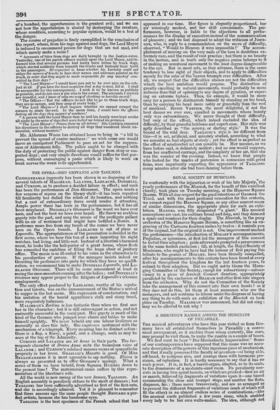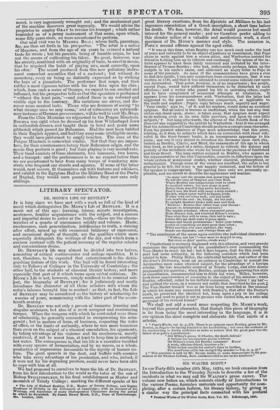A MORNING'S RAMBLE AMONG THE MUSICIANS OF PICCADILLY.
THE musical adventurers who have this year visited us from Ger- many have all established themselves in Piccadilly ; a conve- nient arrangement, as it enables those whom curiosity, like ours, may prompt to visit them, to make the ramble in a couple of hours. We first went to hear "Der Musicalische Improvisator." Some of our contemporaries have supposed that this name was an accu- rate description of the powers of this ingenious piece of mechanism, and that it really possessed the faculty of invention—of being able, off-hand, to compose airs, and arrange them with harmonic pre- cision, ad infinitum. It is hardly necessary to say that it has no such pnver. It is, in fact, a barrel-organ, adapted, as to its scale, to the dimensions of a moderate-sized room. Its peculiarity con- sists in having two spiral barrels, on which are pricked—first an air or march, followed by fragments of variations upon it—one barrel commanding the oboe and trumpet stops, and another the flute, diapason, &c. : these move transversely, and are so arranged as to present the different fragments of variations (each of winch will fit the other) in an almost endless series of combinations,—hke the musical cards published a few years since, which enabled every lady to be her own waltz-maker. The idea, although not novel, is very ingeniously wrought out; and the mechanical part of the machine discovers great ingenuity. We would advise the proprietor to employ GRAY to revoice his trumpet ; which rather reminded us of a penny instrument of that name, upon which, some fifty years since, we were accustomed to perform. Our next visit was to MICHEL BOAT; whose birth, parentage, &c. are thus set forth in his prospectus. "The artist is a native of Mayence, and from the age of six years he evinced a natural taste for music ; but his parents, being of humble origin, he had • not the means of cultivating his talent. So great, however, was his anxiety, combined with an originality of taste, to excel in music, that he acquired the habit of playing airs, most correctly, upon his chin." The sound produced from this new pulsatory instru- ment somewhat resembles that of a castanet ; but without its monotony, every air being as distinctly expressed as by striking the keys of a pianoforte. The performer first soaps, and then rattles a most vigorous tattoo with his two fists upon his chin ; which, from such a series of thumps, we expect to see swelled and inflamed, but his prospectus tells us that the operation is performed "without the least pain,"—and indeed there is no outward and visible sign to the contrary. His variations are clever, and dis- cover some musical taste. Those who are desirous of seeing "to what strange uses we may come," and of witnessing an extraordi- nary instance of German perseverance, will do well to visit Mr. BOA!. From the Chin Musician we adjourned to the Prague Minstrels. BOCHSA was right when he dressed up his four Whitechapel Jews in outlandish dresses, and taught them to howl and grunt some gibberish which passed for Bohemian. Had the men been habited in their English apparel, and had they sung some intelligible music, they would have performed to empty benches. The case of the Prague Minstrels is somewhat similar. Not that they are impos- tors, for their countenances betray their Bohemian origin, and the music they perform is good ; but their playing is very second-rate. Their band consists of three clarionets, two bassoons, two horns, and a trumpet: and the performance is in no respect better than we are accustomed to hear from many troops of wandering min- strels who frequent our streets and squares. If some of the 'latter would, next season, fit themselves out with turbans and whiskers, and exhibit in the Egyptian Hall as the Military Band of the Pacha of Bagdad, they would earn pounds where they now earn only shillings.



























 Previous page
Previous page